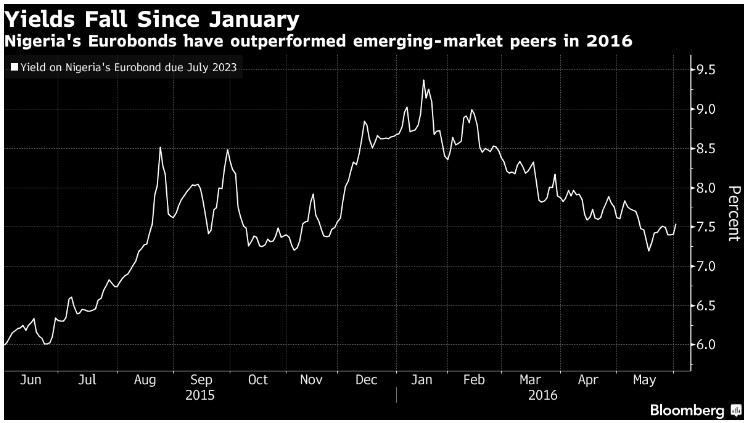This article was written by Paul Wallace. It appeared first on the Bloomberg Terminal.
Nigerian officials are meeting bond investors in London next week, according to a person familiar with the matter, as the government considers tapping international debt markets for the first time in three years to help finance its record budget deficit.
Finance Minister Kemi Adeosun will head the meetings on June 7, which have been arranged by Standard Chartered Plc, according to the person, who asked not to be identified because he’s not authorized to comment publicly. Abraham Nwankwo, head of Nigeria’s Debt Management Office, Dami Adesanya, an adviser at the finance ministry, and a representative of the central bank will be part of the Nigerian delegation, according to the person.
The talks will probably focus on Nigeria’s currency controls and its policy of pegging the naira against the dollar, according to Standard Life Investments Ltd., which manages around $1.3 billion of fixed-income assets in emerging markets. The curbs have exasperated investors, who say the currency is overvalued, and caused investment into Africa’s largest economy to shrivel. Muhammadu Buhari and central bank Governor Godwin Emefiele hinted in the past two weeks that they will shift their stance and allow more flexibility.
“A lot of Nigeria’s problems today can be traced back to the pegged exchange rate,” Mark Baker, a money manager at Standard Life, which has recently bought Nigerian Eurobonds in anticipation of a devaluation, said by phone from London. “The current policy mix is clearly unsustainable, given what’s happened with oil prices and the impact on the fiscal position. A weaker currency is obviously needed to help boost fiscal revenues.”

The government said earlier this year that it plans to raise about $5 billion of external debt in 2016 to help fund a 6.1 trillion naira ($31 billion) budget that’s meant to stimulate its contracting economy. Adeosun said in April that Nigeria was considering a debut yuan-denominated bond as it may be cheaper than dollar-debt.
Nigeria last issued a Eurobond in mid-2013. Yields on its $500 million of securities maturing in July 2023 rose 16 basis points to 7.57 percent by 12:25 p.m. in London. Through yesterday, the bonds had returned 11 percent this year, compared with an 8.6 percent average gain for high-yielding emerging-market sovereign debt tracked by Bloomberg.
Oil Revenue
Nigeria has been battered by falls in the price of oil, which accounted for two-thirds of government revenue and 90 percent of export earnings in 2014. Growth was negative in the first quarter for the first time since 2004 and a recession is imminent, the central bank said last week.
The Abuja-based bank has pegged the naira at 197-199 per dollar since March 2015. Buhari has backed that policy since he came to power two months’ later.
The currency has plummeted to around 350 on the black market as dollar shortages worsen, while forwards contracts suggest it will fall to 286 in three months.














